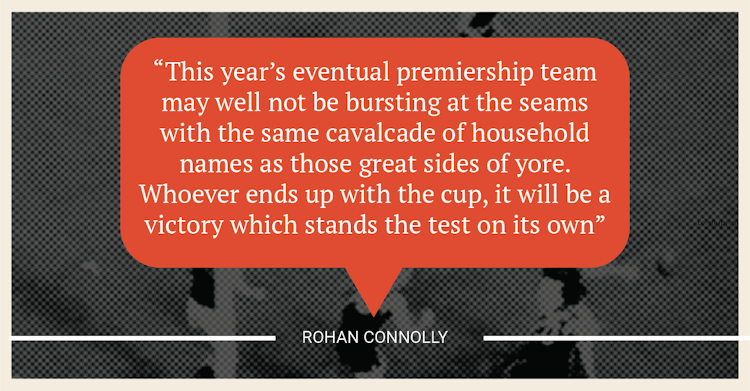All AFL premierships are equal. But are some more equal than others?
Last updated: Aug 16, 2021, 5:21AM | Published: Aug 16, 2021, 4:51AM
All AFL premierships are equal. But are some more equal than others?
No, not really. League football is not (quite) yet subject to the sort of totalitarianism of George Orwell’s “Animal Farm”. But the business of bragging rights when it comes to comparing the merits of particular flags has sure become complicated.
Seldom in the modern era of the game has the metaphorical playing field remained even for long enough to make bragging rights about this premiership team being better than that premiership team anything more than a completely subjective exercise.
In terms of the fixture, for example, only between 1970 and 1986 in the old VFL did the same number of 12 teams play each other twice in a season.
We had a final four, which in 1972 became a final five. Post the rebranding as the AFL in 1990, we’ve had two different versions of a final six in just three years of its operation, then a final eight in 1994, the operation of which changed again in 2000.
Since 1990, at various stages, we’ve had a competition comprising 14,15, 16, 17 and since 2012, 18 different teams. We’ve had finals regulations which insisted higher-qualified teams played lower-ranked teams away.
And last year, of course, we had a grand final played away from the state, let alone ground, in which the biggest game of the year is contracted to be played until 2058. That looks almost certain to be the case this season as well.
The point? That comparisons of this premier versus that one are these days even more futile than they used to be. Perhaps that’s just as well, too, because superficially at least, it’s tempting for sceptics to start looking at 2021 as a “Bradbury” premiership.
RELATED: Check out all of Stats Insider's 2021 AFL season projections
Of course, that’s unfair. But you’d be hard-pressed at the moment to argue that Melbourne, the Western Bulldogs, Geelong, Port Adelaide, Brisbane or Sydney were, purely for talent, in the same sort of ballpark as powerful outfits like early ‘70s Richmond, the Hawks of the late ‘80s, Essendon of 1985 (or even 2000), or more recently, the likes of Brisbane, Geelong or Hawthorn (again).
Melbourne, for example, might be on top of the ladder. But it did take its time putting away a wooden spoon candidate on Sunday after having lost to Adelaide once already this season.
The Demons are also taking into this finals campaign a considerable weight on their shoulders in the shape of a 57-year premiership dry spell. That might be as big an issue for them as any opponent they actually play this September.
What about the Bulldogs? Well, they’ve started to get the wobbles now after losses to Essendon and Hawthorn, and the loss of one key forward in Josh Bruce.
The Doggies had been the freest-scoring side of the competition. Bruce goes over and all of a sudden they’re held to just five goals by the Hawks. Now, even a spot in the top four is in jeopardy, the Bulldogs having to beat Port Adelaide (third) this week or risk having to do it the hard way, and it appears increasingly likely, this time without the benefit of a pre-finals bye.
As for the Power, well, they’ve been incredibly good at beating up on the teams below them, Saturday’s win over Carlton their 21st straight victory over a bottom-eight opponent. They haven’t, however, been so flash at beating opponents on the same level or better.
Brisbane appears to have turned a significant corner in terms of form, but was arguably playing to a more consistent level in its previous two flag campaigns which both finished short of the mark.
As for Sydney, well, whatever happens from here, the Swans have utterly exceeded the expectations of most of the football world. But so raw is so much of Sydney’s line-up that even one finals win would be an achievement of sorts.
Mind you, these are the same sort of judgements about “worst premiers” which were being passed on Richmond after the Tigers’ 2017 flag triumph, judgements which appeared pretty silly after their third premiership in four years in 2020, the last one in particular coming after injuries, off-field issues and of course, the uncertainty and difficulties of coping with life full-time in a hub.
That shouldn’t be forgotten this year, either. In fact, there’s an argument this season’s premier, logistically, will have climbed even more hurdles than the last given the greater amount of uncertainty (even extending to where this year’s flag will actually be won) thanks to the pandemic.
We’ve also had a season in which even the lower teams on the ladder like confirmed wooden spooner North Melbourne, or say Hawthorn a few weeks ago, look far more competitive than most of their predecessors.
RELATED: Why The AFL's Minor Premiership Is A Poisoned Chalice
Is the flag success of one of the widely-regarded “super teams” of modern football history more noteworthy when it might have spent more time during the season beating up on weaker opposition, compared to one of this year’s potential flag crop which has had more challenges simply to win on a weekly basis?
And we all surely at least acknowledge that mechanisms like the draft and salary cap have evened things up across the ledger. Thirteen different premiership clubs across the 30-odd year history of the AFL says plenty.
This year’s eventual premiership team may well not be bursting at the seams with the same cavalcade of household names as those great sides of yore. But standards now are different, not necessarily just inferior. Whoever ends up with the cup, it will be a victory which stands the test on its own merits.
*You can read more of Rohan Connolly’s work at footyology.com.au
Did you enjoy this article? Join our free mailing list to get the best content delivered straight to your inbox, or join the conversation by leaving a comment below or on the Stats Insider Twitter or Facebook page.



